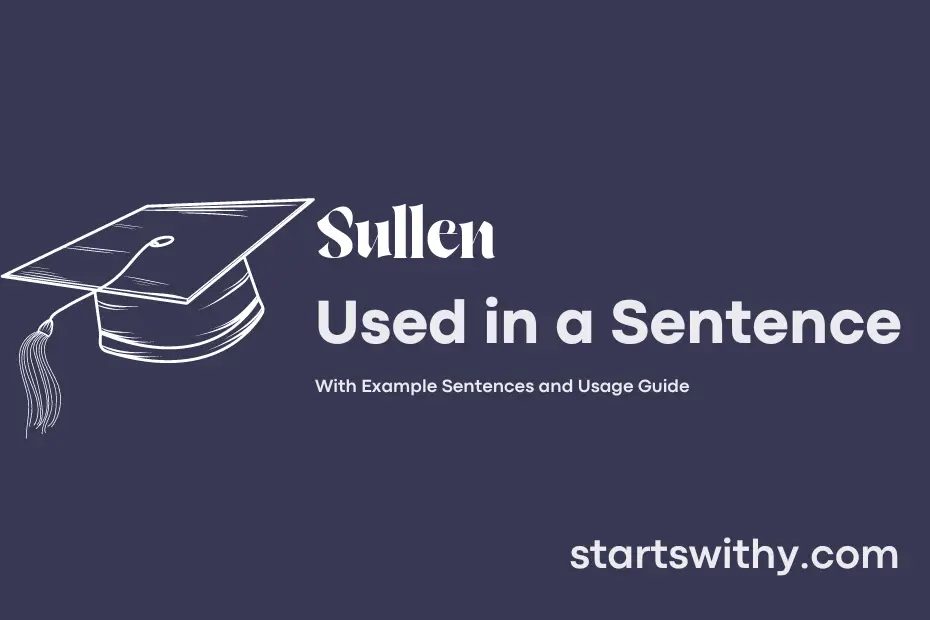When someone is feeling sullen, they are showing a gloomy or unhappy mood. It’s evident in their body language, facial expressions, and overall demeanor. This emotion can stem from various sources like disappointment, loneliness, or frustration.
7 Examples Of Sullen Used In a Sentence For Kids
- Sullen clouds covered the sky on a rainy day.
- The sad puppy had a sullen expression on its face.
- The boy had a sullen look after losing his favorite toy.
- The old man sat in the park with a sullen demeanor.
- The dark room felt sullen and gloomy.
- The girl’s sullen mood lifted when her friend arrived to play.
- The teacher noticed the sullen faces of the students on a Monday morning.
14 Sentences with Sullen Examples
- Sullen faces were everywhere after the exam results were announced.
- The sullen attitude of the professor made the students feel uneasy in class.
- The sullen silence in the library was disrupted by a loud group of students.
- She sat alone in the corner, looking sullen as she scrolled through her phone.
- The sullen expressions of the students indicated their disappointment with the event.
- Despite the professor’s efforts to engage the class, they remained sullen and unresponsive.
- The weather outside matched the sullen mood of the students stuck indoors studying.
- Walking into the hostel common room, I was met with a sullen atmosphere.
- The sullen faces of the students waiting in line for food reflected their hunger and impatience.
- His sullen demeanor suggested he was struggling with a personal issue.
- The sullen student reluctantly attended the career counseling session.
- The sullen response from the administration regarding student concerns only added to the tension on campus.
- The sullen group of friends sat together in the cafeteria, each lost in their own thoughts.
- The professor’s abrupt departure left the students feeling sullen and confused.
How To Use Sullen in Sentences?
Sullen is used to describe someone who is gloomy, sulky, or in a bad mood. Here’s a helpful guide on how to use sullen in a sentence for beginners:
-
Adjective usage: When someone is feeling sad or upset and has a negative or grumpy expression on their face, you can describe them as sullen. For example, “After the argument, Sarah sat in the corner with a sullen expression on her face.”
-
Tone: The word sullen can also be used to describe a mood or atmosphere that is dark, gloomy, or somber. For instance, “The stormy weather matched the sullen mood of the character in the book.”
-
Behavior: If someone is unresponsive, sulking, or uncooperative, you can use sullen to describe their attitude. For instance, “Despite numerous attempts to cheer him up, Jack remained sullen and withdrawn.”
-
Scenery: In describing a setting, such as a landscape or a room, you can use sullen to convey a feeling of dreariness or sadness. For example, “The abandoned house stood on the hill, surrounded by a sullen forest.”
Remember, using sullen to describe someone’s mood or atmosphere can help convey a sense of gloominess or unhappiness. Practice using sullen in different contexts to become more familiar with its usage.
Conclusion
In conclusion, sullen emotions are evident in sentences where individuals express sadness, resentment, or gloominess. These emotions can be conveyed through facial expressions, body language, and the tone of a sentence. The use of words like “morose,” “gloomy,” and “melancholy” can help create the atmosphere of sullenness in writing, portraying a sense of despondency or discontent.
Sullen sentences depict a mood of brooding discontent or sulky resentment. By using language that evokes feelings of unhappiness or gloom, writers can effectively communicate the sullen emotions of their characters or convey a somber tone in their narratives. Recognizing and understanding the nuances of sullen sentences can enhance the emotional depth and impact of written communication.



